For $120, I could get two nights at Flaming Gorge Resort, two dinners topped with the best blackberry cobbler I’ve found, and an entire weekend mostly to myself on Utah’s portion of the Green River. This was a few years ago, back when I was more broke than I am now, but with far fewer responsibilities and more time to devote to fishing. And this deal was only available when the resort started offering offseason pricing. I couldn’t afford to be around when the fishing — and the weather — was at its peak.
The Green is unquestionably Utah’s best fishery, even in the throes of winter. It’s a demanding river, one that rewards astute, persistent anglers. Growing up on the small streams of the Wasatch Front Range, I always heard my dad and his fishing buddies talk about the Green in reverential tones. It was a place to learn, to hone your skills as a fly fisherman, according to the group of men who taught me how to fly fish.
That’s why, on a Sunday morning in late December, I stood waist-deep in the Green River. The famous red rock walls were covered in fresh, light Rocky Mountain powder. Pinyon and juniper clung to the canyon walls, their metallic green color more prominent than at any other time of year. My fingers were numb, my toes were getting there, and my face was windburned, but I’d caught just enough fish that morning to make the discomfort tolerable.
The first flurries of another snow storm began to fall in lazy swirls, but I barely noticed since as my attention was commanded by a large rainbow trout 20 yards upstream. The fish swam back and forth behind a big boulder, actively feeding on something – a something I apparently didn’t have in my fly box.
I’d caught plenty of fish already that morning, and more the day before, including one rainbow that was 22 inches long and fat enough around that I couldn’t grip it with two hands. The fish in front of me, though, wasn’t cooperating. For two days I’d swung pegged beads, consistently picking off fish that sat far behind and away from the giant brown trout redds that dominated the river bottom.
More Like This
But this rainbow wouldn’t so much as look at my mottled mango eight-millimeter trout bead and Gamakatsu octopus circle hook. After half an hour of the worst cold shoulder a trout’s ever given me, I grudgingly switched to a cadre of small nymphs.
This time, the rainbow at least glanced at my flies.
I was retying for the hundredth time, cursing my numb fingers and tiny tippet, when I heard someone ask me how the fishing was.
My neck snapped up in surprise. My car was the only one in the parking lot that morning, and the lazy snow of earlier was now an honest blizzard. Who else was either destitute or trout-crazed enough that they’d come visit in such terrible weather.
The voice belonged to a man, about my height, and nearly two decades my senior. To my surprise, he didn’t carry a fly rod. He wasn’t even wearing waders. All he had was a camera strapped around his neck.
“The fishing’s been good,” I said. “But I can’t seem to get this big fish to cooperate.”
The man nodded. “I know, I’ve been watching for a bit. I grabbed a few pictures, if you don’t mind.”
“Not at all,” I replied.
“What are you throwing at that fish?” The man asked.
I held up my rig of two small nymphs – midges, I think they were – and the man shook his head. “Do you have anything bigger?”
I looked at him quizzically. We were within shouting distance of the Flaming Gorge Dam. The Green, at that point, is a tailwater full of the pickiest trout you’ll find this side of Colorado. Tailwater trout demand small flies, light tippet, and inhuman patience to catch. That’s what I’d been taught, at least.
I let the man go through my fly box, and he pulled out a size 12 pheasant tail. “Are you sure?” I asked him.
He nodded.
I tied it on, still not sure what the guy was up to. But two casts later, I’d hooked the rainbow that had ignored me all morning. After nearly taking a swim in the frigid water, I scooped it into my net and gave the photographer a fish-slime-covered, but enthusiastic, high-five.
A few photos later and the fish was back in the river. I turned to thank the photographer again, and he shrugged it off. “I used to guide here,” he said. “I couldn’t help myself, really. Sorry if I imposed.”
We exchanged contact information, so I could get a few of the photos, and he walked away into the blizzard.
Months later, in much warmer weather, I was hundreds of miles to the west, in Oregon with my buddy Mike Kingsbury. It was one of those brilliant fall days, warmer than it ought to be, but tinged with a crispness to the air that belied oncoming cold.
The river was crowded, and Mike and I were ostentatiously the only guys catching fish. As far as we could tell, we were the only guys using our particular setup, too.
One of the other anglers, younger, closer to my age than Mike’s 40-something, was visibly frustrated. He scowled in our direction each time Mike or I hooked into a fish. For our part, we weren’t trying to show off, but we’re both loud guys and the fishing — for us at least — was fast.
I’m not sure why, but something about the expression on the younger angler’s face made me think back to that December, a year before, when the man appeared out of the blizzard to help me. That man turned out to be Ryan Kelly, an outstanding photographer and filmmaker, and one of my closest friends.
In the year since I’d met Ryan, he taught me more about fly fishing in exchange for my help with his regular photoshoots on the Green. It was a sweet deal for us both, though I always feel that I get more than I gave, even if Ryan doesn’t see it that way.
After another scowl from the younger angler, I set my rod aside and walked over to him.
“You need a hand?” I asked.
He looked taken aback. “What the hell are you catching all those fish on?”
I grinned. “Here, let me show you.”
A few minutes later, with a new rig and some extra flies, he cradled a 20-inch brown in the net. The scowl was replaced with a smile bound to crack his face, and as I went back to my spot on the river to keep fishing, he thrust out his hand. “Thank you so much,” he said. “I really didn’t want to get skunked today.”
“Don’t worry about it,” I said. “I’m happy to help. Holler if you need anything else.”
Later, around the fire that night, I thought back to the angler I’d helped out, and to Ryan’s similar help the year before. If it weren’t for Ryan’s willingness to lend a hand, I probably wouldn’t have caught that big rainbow. And who knows if the kid I helped in Oregon would’ve caught that brown?
It’s more than just helping each other catch fish, I thought, staring at a campfire while Mike grilled hot dogs for dinner. It’s reminding us to help where we can.
I don’t know what happened to that angler in Oregon, but I know that without the help Ryan showed me — and countless others like him — I wouldn’t have likely kept at fly fishing with this level of commitment. Long days of getting skunked, doubting yourself, and watching others catch fish is enough to make the casual angler quit the sport.
Lending a hand only takes a few minutes, and it might just be the hand that keeps the next generation of young anglers on the river.




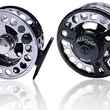
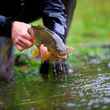


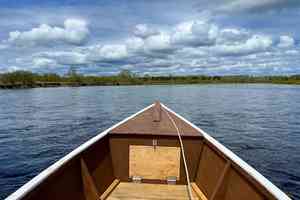



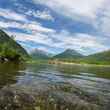
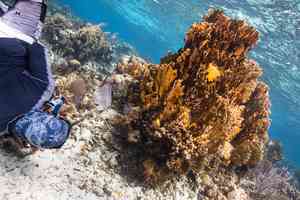


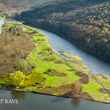
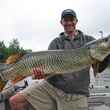



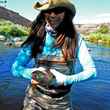
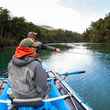



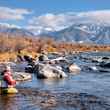
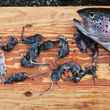
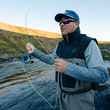

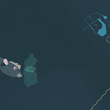
Comments
Carl Crawford replied on Permalink
That is the essence of the sport. I have several stories that I share of anglers that did the same for me during my early days. Each year I am able to add to that list of stories. I like to think that somewhere there are anglers that are sharing stories of the aid that I provided them.
Mike Tichenor replied on Permalink
I grew up where Roaring River dumped into Table Rock as it was filling up in the early 60s. I cut my fishing teeth on lures I still use today. Not the original ones, of course, but the exact same lures...Gilmore Hoodler, Texas-rigged worms, good old crankbaits. On recent fishing trips with a new buddy who carries enough gear to open a small shop. Nearly every time we've gone since spring, I skunk him. He keeps throwing funky colored lures I playfully call tourist tackle, so the last couple of trips I've either loaned him a solid stand-by of mine, or I intentionally left obvious fish holding cast spots for him, or both, and he catches fish way better. In my quest to be a good host, I don't let him see me squirm when he cheers and counts the fish. It's all good. There are plenty of fish. Even a few that'll hit a tourist lure.
Karl replied on Permalink
Enlightening, uplifting bit of prose.
I am 73, been fly fishing for +-55 years, still learning nuances of the sport, so, this article resonates with me.
I welcome advice and offer same when appropriate.
Thanks
Jeff Bandy replied on Permalink
I joined my local fly club after a great guy helped me out one day. That was 20 years ago and I have so many great memories because of that tip.
HH replied on Permalink
I’ve learned a lot and taught a lot on rivers over the years but will say it’s not always welcome. For me it’s about figuring it out, not catching the fish. In most cases, I’d rather be skunked than take the fly that’s working from the guy upstream. Maybe I’d ask in the parking lot on the way home if it was a particularly difficult night, but for me, figuring it out is 100% of the fun.
Brett Bolinger replied on Permalink
I know this story is about helping fly fishing angulars out, but what about that big fish. Sure would like to see a picture of it.
Scott Allen replied on Permalink
Beautifully written. Thank you for sharing.
Anonymous replied on Permalink
I have read alot stories over time about hunting and fishing....this small story is how a picture the hope of future...it's the small miracles of a person in the midst of a snow storm...or the dad who watches from a far then offers a sliver of advice with a smile...or finally seeing the glory of the brookies hiding in the tags the sets your children on fire..thanks for the story .I needed to read a story of gentle guidance.
Pages